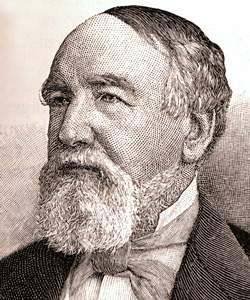Norman Buel Judd (Congressional Biographical Directory)
Reference
JUDD, Norman Buel, (grandfather of Norman Judd Gould), a Representative from Illinois; born in Rome, N.Y., January 10, 1815; received a liberal schooling; studied law; was admitted to the bar in 1836 and commenced practice in Rome, N.Y.; moved to Chicago, Ill., in 1836 and continued the practice of his profession; city attorney 1837-1839; member of the State senate 1844-1860; delegate to the Republican National Convention in 1860; appointed Minister Plenipotentiary to Berlin by President Lincoln March 6, 1861, and served until 1865; elected as a Republican to the Fortieth and Forty-first Congresses (March 4, 1867-March 3, 1871); declined to be a candidate for reelection in 1870; appointed collector at the port of Chicago by President Grant December 5, 1872, and served until his death in Chicago, Ill., November 11, 1878; interment in Graceland Cemetery.
"Judd, Norman Buel," Biographical Directory of the United States Congress, 1774 to Present, http://bioguide.congress.gov/scripts/biodisplay.pl?index=J000277.
Norman Buel Judd (American National Biography)
Scholarship
Judd and his faction of Independent Democrats in the Illinois State Senate held the balance of power in the election of a U.S. senator in 1855. He and three other Independent Democrats decided not to support Abraham Lincoln for the position, mostly because of Lincoln's Whig affiliation. When Lincoln saw that he might be defeated, he threw his support to the anti-Nebraska Democrat Lyman Trumbull, the ultimate victor and a friend of Judd's. By 1856 Judd had become a Republican. He attended the anti-Nebraska convention at Bloomington, Illinois, that created the state Republican organization, he was chairman of the Republican State Central Committee from 1856 to 1861, and during that same period he was a member of the Republican National Committee. However, because of his opposition to Lincoln in the 1855 election, Judd was always regarded with suspicion by former Whigs within the Illinois Republican party. He was nevertheless genuinely devoted to the Republican party and to Lincoln. In 1858 he helped arrange the Lincoln-Douglas debates, advised Lincoln throughout the contest for the senatorship, and helped manage the campaign in northern Illinois. When Lincoln lost the election, Judd received much of the blame. One of his leading critics was John Wentworth of Chicago, who privately circulated the opinion that Judd cared more about his own political advancement than he did about Lincoln's. The charge was a harmful exaggeration: Judd did wish to become governor of Illinois, but he was equally interested in Lincoln's election as senator.
Michael Vorenberg, "Judd, Norman Buel," American National Biography Online, February 2000, http://www.anb.org/articles/04/04-00587.html.



